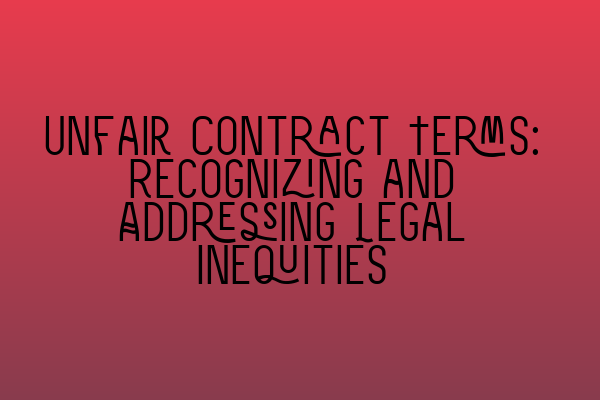Unfair Contract Terms: Recognizing and Addressing Legal Inequities
Contracts are the foundation of business and personal relationships, providing a framework for parties to agree on rights, obligations, and remedies. However, not all contracts are created equal. In some cases, one party may have more bargaining power, allowing them to insert unfair terms that can lead to legal inequities. As solicitors, it is our duty to recognize and address these unfair contract terms to ensure fairness and justice for all parties involved.
The Problem of Unfair Contract Terms
Unfair contract terms can be detrimental to the less powerful party, often leaving them in a position of disadvantage. These terms can include clauses that limit liability, exclude certain rights, or impose unreasonable obligations on one party. In many cases, the less powerful party may not even be aware of the unfairness of these terms or may feel coerced into accepting them to secure the deal.
Unfair contract terms can occur in various sectors, including consumer contracts, employment agreements, and business-to-business transactions. They can have a wide range of negative consequences, such as restricting access to legal remedies, denying essential rights, and exacerbating power imbalances between parties.
Identifying Unfair Contract Terms
Recognizing unfair contract terms requires a keen eye for detail and a comprehensive understanding of contract law. Some common indicators of unfairness include:
- Overly restrictive limitation of liability: Contracts that excessively limit one party’s liability, absolving them of their obligations, can be unfair and create an imbalance in responsibilities.
- Exclusion of essential rights: If a contract excludes rights that are typically expected and needed for a fair and just agreement, it may be considered unfair.
- Unreasonable obligations: Unfair contracts may impose unreasonable obligations on one party, resulting in undue burdens and potential harm.
- Imbalanced bargaining power: Contracts where one party significantly holds more power and uses it to insert unfair terms are likely to be unjust.
These are just a few examples, and each case should be carefully examined to determine the fairness of the contract terms involved.
Addressing Unfair Contract Terms
When confronted with a contract containing unfair terms, it is essential to take action to rectify the inequities. Here are some steps solicitors can take:
- Educate clients: Provide clients with a clear understanding of their rights and obligations under the contract and explain any potentially unfair terms.
- Negotiate fair terms: Engage in negotiations with the opposing party to seek amendments or removal of unfair terms, ensuring a more equitable agreement.
- Consider legal remedies: If negotiations fail, explore legal remedies available to challenge unfair contract terms, such as seeking redress through the court system.
It is important to note that resolving unfair contract terms requires specific expertise in contract law. Seeking the assistance of a qualified solicitor knowledgeable in this field is crucial to navigate the complexities of the legal system and increase the chances of achieving a fair outcome.
Conclusion
Unfair contract terms can tip the scales of justice in favor of one party, leaving the other vulnerable and disadvantaged. As solicitors, it is our responsibility to recognize the existence of these unfair terms and take appropriate steps to address them. By educating clients, negotiating fair terms, and exploring legal remedies, we can help ensure fairness and justice prevail in the realm of contract law.
To further enhance your understanding of contract law and prepare for the SQE exams, we recommend exploring the following related articles:
